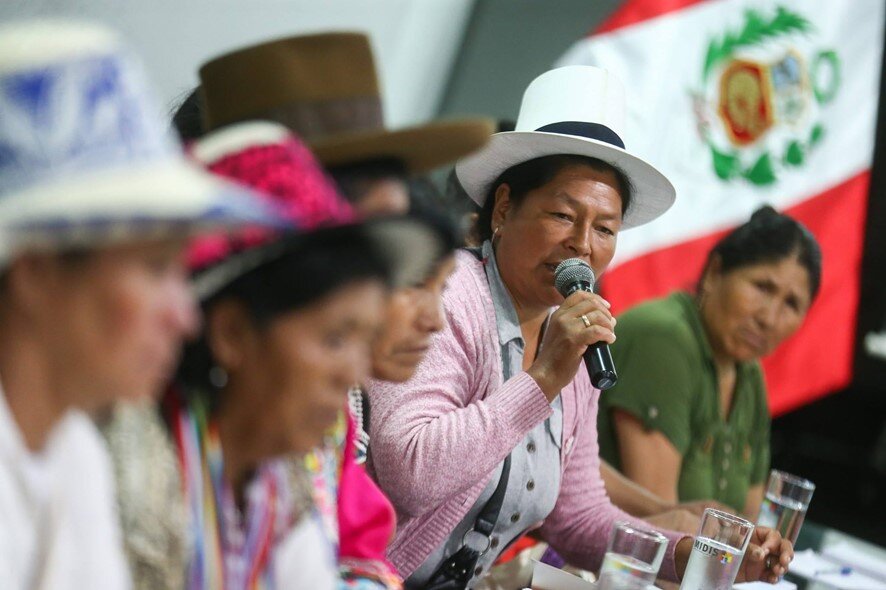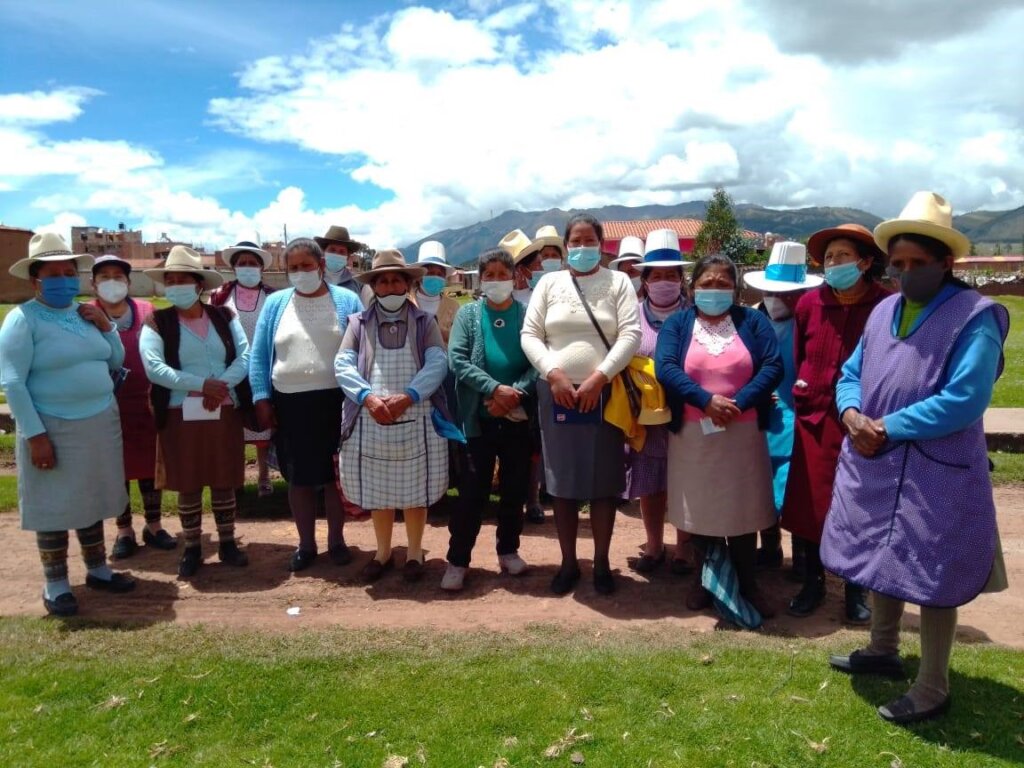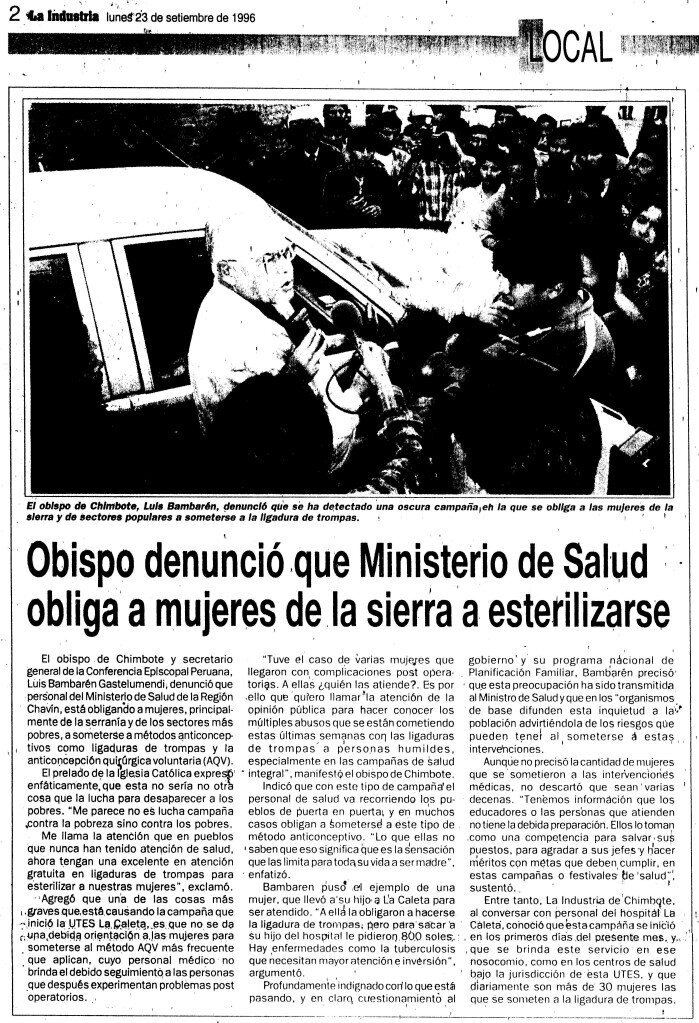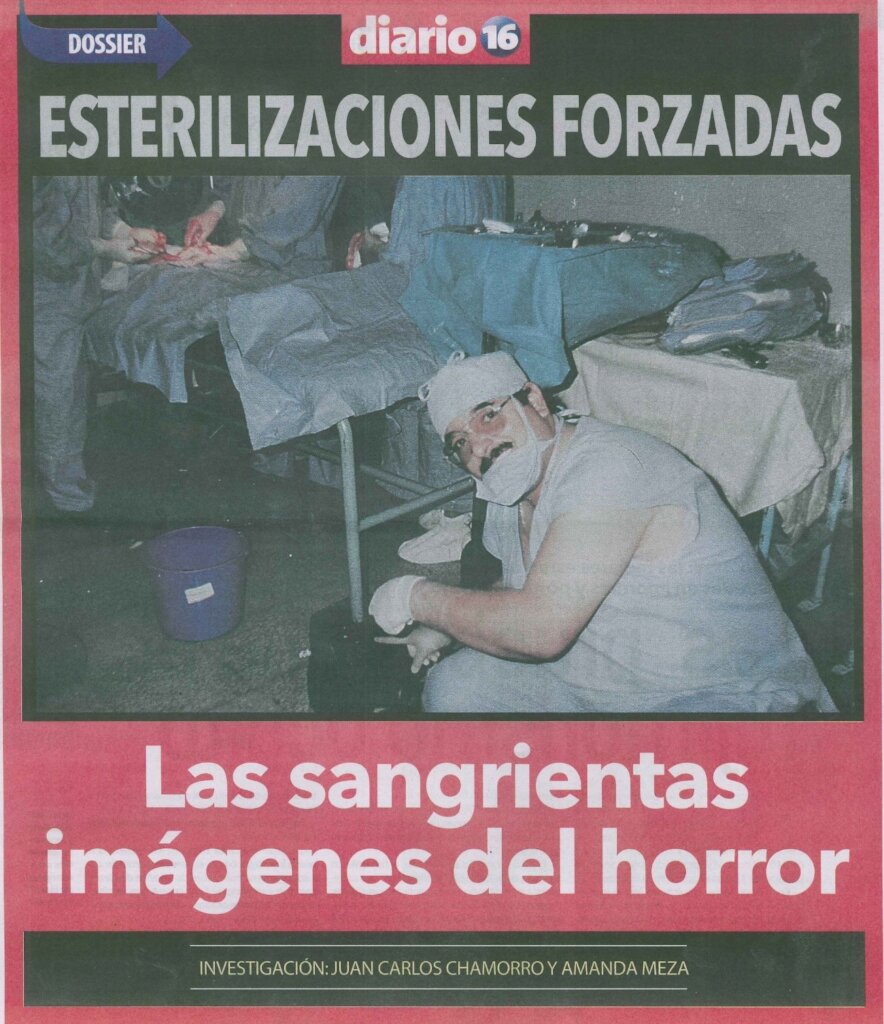By Vero Ferrari | In close collaboration with the activists
How much longer will they have to wait for the justice that has been denied for so long? Forced sterilisations, an enormous outstanding case in Peru
We asked Vero to write about AMPAEF (Association of Peruvian Women Affected by Forced Sterilisations), a national organisation of women who suffered first-hand, and to this day live with the consequences of, a public policy that violated their physical integrity, their lives and threatened their reproductive freedom.
Rute gives us a little of her time on a Saturday in the middle of a market where she is selling her agricultural products to maintain her household. She looks like any other woman among many who make multiple efforts to survive with their families, but Rute is the president of AMPAEF, Association of Peruvian Women Affected by Forced Sterilisations. That is, she is one of the almost 300,000 women that were sterilised in the midst of the massive logistical deployment of a genocidal state policy planned, directed, celebrated and that still goes unpunished by the dictatorship of Alberto Fujimori in the 90s, more precisely between 1996 and 2001, called the National Program for Reproductive Health and Family Planning.
If it had not been for the first complainants, women from Anta (Cusco), where Rute comes from; for the spontaneous self-organisation of many of these women throughout Peru to confront the violation of their human rights; and for the feminist investigations, particularly by Giulia, a Peruvian lawyer who, in 1998, revealed what was happening when she published the report entitled “Nada Personal. Reporte de Derechos Humanos sobre la Aplicación de la Anticoncepción Quirúrgica en Perú 1996-1998” (Nothing Personal. Human Rights Report on the Application of Surgical Contraception in Peru 1996-1998 ) [1]; then the life and health of thousands of indigenous, peasant and Quechua-speaking women would have continued to be affected by politicians, officials and health workers who to this day have not been sanctioned. Such is the case of former Health Ministers Eduardo Yong Motta, Marino Costa Bauer and Alejandro Aguinaga. The latter is even now a congressman for the Fujimori party, demonstrating, once again, how little some lives matter.
Behind Alberto Fujimori's political speech in Beijing [2], in which he stated his objective to be that “women would be owners of their bodies” and that this would reduce poverty in Peru, there was a more ominous plan: to exterminate the poor, in this case, the very poorest women.
Almost three decades later, the publically declared objective was never met: the female victims of forced sterilisations not only did not escape poverty, but were plunged deeper into it, they had to endure the pain of a forced, abusive, careless and negligent surgical operation; the pressures and humiliations of medical personnel who appealed to the banality of evil to complete their daily quotas of surgical interventions; the torturous and chronic consequences of physical and mental health until the end of their time; and, those who did not die, the radical change in their life plans, often adding to family and social contempt, the abandonment of their partners in several cases, post-traumatic stress and their ongoing legal processes, as well as the lack of comprehensive reparation on the part of each government in power.
In times when audio-visual material is vital to generate indubitable evidence of human rights violations, the documentary “Nada Personal (Nothing Personal)” [3] was able to record the testimonies of women who had been sterilised a few days before in Huancabamba (Piura) in a Campaign of Surgical Contraception on November 22 and 23, 1996. The horrifying images speak for themselves.
At the end of the 90s, twelve women from Anta travelled to Lima to denounce the violation of their human rights through forced sterilisations. This sparked the process of self-organisation of the victims. They called themselves AMAEF (Association of Women Affected by Forced Sterilisations), finding each other in various towns and districts. Currently there are 14 organisations from various regions of Peru such as Ayacucho, Cajamarca, Cusco, Huancavelica, Lima, Callao, Loreto, Piura, San Martín. In 2015, they were recognised as female victims and they were registered in the REVIESFO (Registry of Victims of Forced Sterilisation), a registry administered by the Ministry of Justice and Human Rights, created to identify the number of people affected by this disastrous public health policy. There are more than 8,000 women registered.
They meet once a month in a general assembly, after their own local meetings. Together, the women of Anta coordinate their future activist activities and agree on ways to collaborate with their colleagues who are sick. They have formed a group to be able to make themselves heard in the face of an indolent State, but also to resist together the vicissitudes they are going through.
Rute tells us how their cases are progressing: “We are requesting that forced sterilisations be included amongst the grounds for the extradition of Alberto Fujimori in the Supreme Court of Chile. We have six cases lodged with CEDAW (Committee on the Elimination of Discrimination against Women) and three with the UN Non-Discrimination Committee. What we want is for progress to be made, we want comprehensive reparation and that at least we get enough money for our illnesses.”
“With the grant from Fondo de Mujeres del Sur our members from other places where they could not travel have been able to travel and we have had enough for our activities, the funding is highly necessary, it has made it easier for us to organise ourselves a little more, now we are more united, more organised and we are going to continue with our fight, prior to the grant we could not travel anywhere, we could not go to the marches to protest, as simple as that we could not go, where would we get the money from, because what we grow in the fields does not get a good price, we do not have a higher education. With the training we are making ourselves become heard more,” says Rute.
The struggle led by AMPAEF women is recognised nationally and internationally. In 2021, the Ministry of Women and Vulnerable Populations awarded the “Order of Merit for Women” to 14 presidents of the association. Just a few hours before finalising this article we learned that the International Centre for the Promotion of Human Rights CIPDH-UNESCO has chosen Rute Zúñiga to present the Annual Award to Human Rights Defenders.
May her story and that of thousands of women who are still calling for justice be heard, repaired and appreciated, because their lives are worth as much as any other life.
----
[1]"Nada Personal. Reporte de Derechos Humanos sobre la Aplicación de la Anticoncepción Quirúgica en Perú 1996-1998” ("Nothing Personal. Human Rights Report on the Application of Surgical Contraception in Peru 1996-1998"): https://1996pnsrpf2000.files.wordpress.com/2011/07/cladem_nada-personal.pdf
[2] The 1995 Fourth World Conference on Women, held in Beijing, China, was one of the most important events on women's human rights, as the proposals of the three previous conferences were consolidated in the Beijing Declaration and the Platform for Action which were adopted by 189 countries. That space was used strategically by Alberto Fujimori, who attended the conference and launched his family planning campaign. For more information see: https://www.un.org/es/conferences/women/beijing1995 y https://elpais.com/diario/1995/09/12/sociedad/810856806_850215.html
[3] “Nada personal (Nothing personal)” was the documentary directed by Carlos Cárdenas, who accompanied Giulia Tamayo throughout her investigations: https://www.youtube.com/watch?v=c0QIYcrUazs
Links:
Project reports on GlobalGiving are posted directly to globalgiving.org by Project Leaders as they are completed, generally every 3-4 months. To protect the integrity of these documents, GlobalGiving does not alter them; therefore you may find some language or formatting issues.
If you donate to this project or have donated to this project, you can recieve an email when this project posts a report. You can also subscribe for reports without donating.
Support this important cause by creating a personalized fundraising page.
Start a Fundraiser


